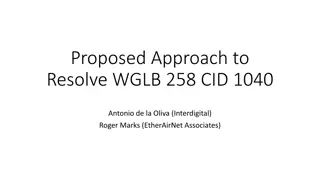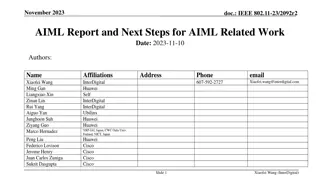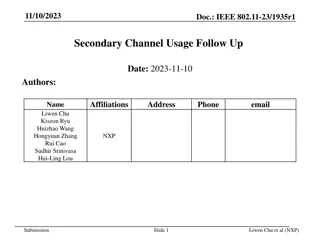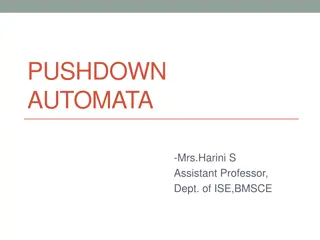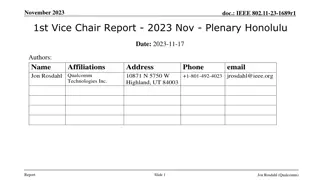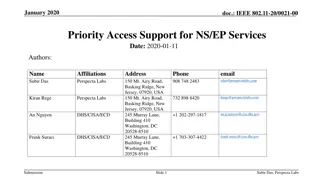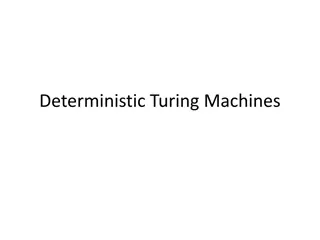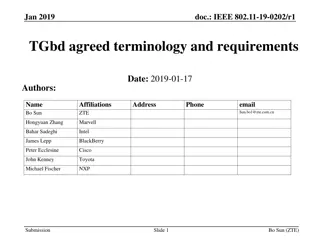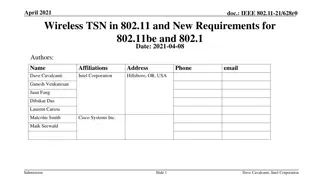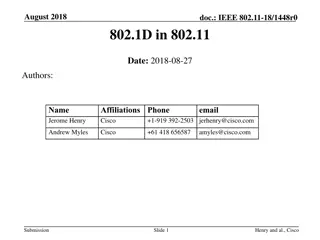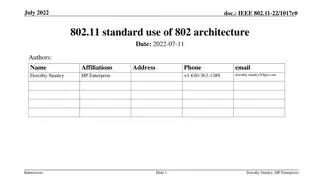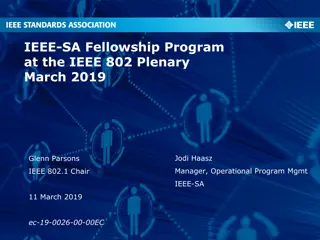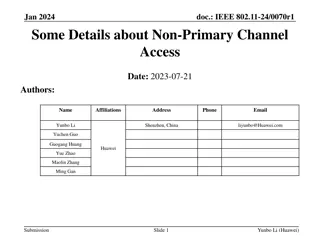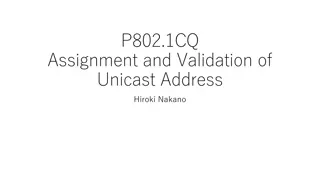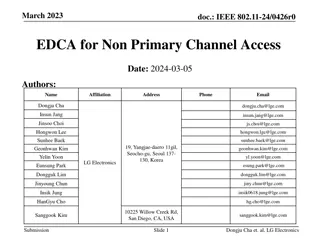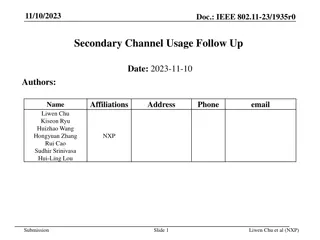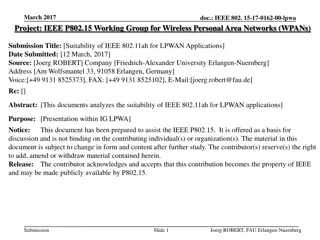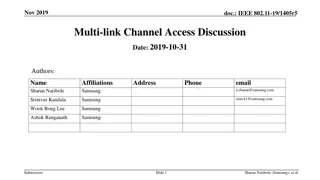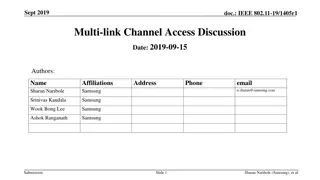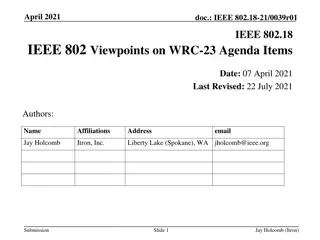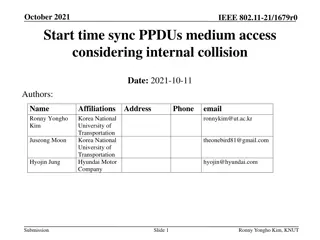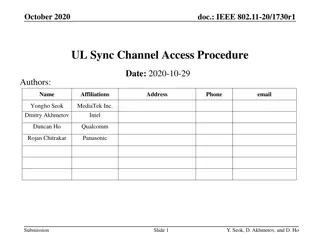IEEE 802.11-17/1428r1 Deterministic Backoff Rules
This document discusses the deterministic backoff rules for IEEE 802.11-17/1428r1 protocol. It covers scenarios where fewer than three consecutive collisions occur and outlines the specific backoff algorithm to be followed. The document includes simulations and analysis pertaining to deterministic backoff mechanisms in wireless communication systems.
Download Presentation

Please find below an Image/Link to download the presentation.
The content on the website is provided AS IS for your information and personal use only. It may not be sold, licensed, or shared on other websites without obtaining consent from the author.If you encounter any issues during the download, it is possible that the publisher has removed the file from their server.
You are allowed to download the files provided on this website for personal or commercial use, subject to the condition that they are used lawfully. All files are the property of their respective owners.
The content on the website is provided AS IS for your information and personal use only. It may not be sold, licensed, or shared on other websites without obtaining consent from the author.
E N D
Presentation Transcript
SEEKING OTHER EMPLOYMENT Elaine Newton, OGE Kerri Cox, ODNI Gaye Williams, Commerce
Background General Principle #10 Employees shall not engage in outside employment or activities, including seeking or negotiating for employment, that conflict with official Government duties and responsibilities Subpart F seeking other employment 18 U.S.C. 208(a) negotiating for employment STOCK Act provisions notification requirements for public financial disclosure report filers regarding negotiations for or agreement of future employment or compensation
Employment Definition 5 C.F.R. 2635.603(a) Any form of non-Federal employment or business relationship involving the provision of personal services by the employee, whether to be undertaken at the same time as or subsequent to Federal employment CURRENT EXAMPLE 2: highlights that employment may be compensated or uncompensated PROPOSED NEW EXAMPLE 3: An employee at the Department of Energy volunteers without compensation to serve dinners at a homeless shelter each month. The employee s uncompensated volunteer services in this case are not considered an employment or business relationship for purposes of this subpart.
Seeking Employment 5 C.F.R. 2635.603(b) Seeking employment means directly or indirectly making an unsolicited communication to any person or their intermediary regarding possible employment OR an employee makes a response, other than rejection,* to an unsolicited communication from any person or their intermediary regarding possible employment An employee is not seeking if the communication is to only request a job application An employee is no longer seeking if: the employee or prospective employer rejects the possibility of employment and all discussion of possible employment has terminated two months have passed since the employee sent an unsolicited resume or employment proposal * deferring discussions until the foreseeable future is not rejection
Seeking Employment & Social Media The PROPOSED AMENDMENTS to Subpart F provide a number of examples discussing the posting of resumes online. In general, if an employee posts her resume online, she is not seeking -- if the employee is notified that Company A has viewed the employee s resume, the employee is not seeking if Company A contacts the employee and the employee responds with something other than rejection, the employee is seeking if Company B contacts the employee, but the employee does not respond, then the employee is not seeking
Seeking Employment & Social Media Hypotheticals
Where Seeking and Negotiating Meet Part 1 of current Example #3, 5 C.F.R. 2635.603: An employee is auditing a contractor and while at the contractor s office, the head of the contractor s accounting division tells the employee that they are thinking about hiring another accountant and asks if the employee is interested in leaving his agency. The employee says he is interested in knowing what kind of work would be involved. PROPOSED ADMENDMENT: The employee has begun seeking employment because he made a response other than a rejection to the communication regarding possible employment, but he has not yet begun negotiating for employment.
D0-04-029 5 C.F.R. 2634.604(a) obligation not to participate personally and substantially in a particular matter that, to the employee s knowledge, has a direct and predictable effect on the financial interests of a prospective employer with whom the employee is seeking employment. 5 C.F.R. 2635.604(b) should notify the person responsible for the employee s assignment What advice would you give the employee in Example #3, part 1? timing in talking to employee (ethics training) recusal, but no need to tell supervisor (not mandatory) managing workload (agency s considerations) PROPOSED AMENDMENT to 604(b): employee must take whatever steps are necessary to ensure that he does not participate in the matter
Negotiating for Employment 5 C.F.R. 2635.603(b) Negotiating for employment means discussion or communication with another person, or such person s agent or intermediary, mutually conducted with a view toward reaching an agreement regarding possible employment with that person. The term is not limited to discussions of specific terms and conditions of employment in a specific position.
Part 2 of current Example #3, 5 C.F.R. 2635.603 They discuss the duties of the position the accounting division would like to fill and the employee s qualifications. They do not discuss salary and the head of the accounting division explains that he has not yet received authorization to fill the particular position and will get back to the employee after getting the approval for additional staffing.
PROPOSED AMENDMENT is to make part 2 of current Example #3, 5 C.F.R. 2635.603 into a stand alone example that follows United States v. Schaltenbrand, 930 F.2d 1554 (11th Cir. 1991) The DCAA employee and the head of the contractor s accounting division in the previous example have a meeting to discuss the duties of the position that the accounting division would like to fill and the DCAA employee s qualifications for the position. They also discuss ways the DCAA employee could remedy one of the missing qualifications, and the employee indicates a willingness to obtain the proper qualifications. They do not discuss salary. The employee has engaged in negotiations regarding possible employment with the contractor.
1991-1992 OGE Prosecution Survey November 4, 1992 Air Force Colonel Eugene Schaltenbrand was convicted in 1989 of violating 18 U.S.C. 208 and 18 U.S.C. 207. Schaltenbrand, while working as a Government employee, had met with representatives of Teledyne Brown Engineering regarding an employment opportunity at that company. The employment opportunity related to a project that Schaltenbrand was working on as a Government employee. Schaltenbrand appealed his conviction on the section 208 charge on the basis that his discussions with Teledyne Brown did not constitute "negotiating for employment" under section 208. Schaltenbrand essentially contended that no negotiation had taken place because no offer of employment had been made. The Court of Appeals reviewed the evidence, which showed that the parties had discussed a specific position, the qualifications for the position, and to a limited extent, the degree to which Schaltenbrand fit the qualifications. The Court of Appeals affirmed Schaltenbrand's conviction finding that negotiation had taken place notwithstanding Schaltenbrand's contention that no offer of employment was made while Schaltenbrand was with the Government. See United States v. Schaltenbrand, 930 F.2d 1554 (11th Cir. 1991).
Waivers and Authorizations 5 C.F.R. 2635.605(a) an employee may participate in discussions that constitute negotiations after receiving a written waiver issued under 18 U.S.C. 208(b)(1) or (b)(3). 5 C.F.R. 2635.605(b) where an employee is seeking employment and a reasonable person questions his impartiality, the employee may continue to participate in the particular matters if the agency designee authorizes the employee s participation in accordance with 5 C.F.R. 2635.502(d).
Disqualification based on an arrangement for prospective employment 5 C.F.R. 2635.606(a) an employee may not participate personally and substantially in a particular matter that, to the employee s knowledge, has a direct and predicable effect on the financial interests of the person with whom he or she has an arrangement for future employment, unless the employee is authorized to participate 5 C.F.R. 2635.606(b) if the employee rejects an offer of employment or an offer is not made, the agency may determine that the employee should continue to be disqualified, if the employee s impartiality could be questioned
Section 17 of the STOCK Act The Stop Trading on Congressional Knowledge Act of 2012 (STOCK Act) requires a covered employee (public filer) to notify their ethics official within three days after they begin negotiating or have an agreement for future employment or compensation PROPOSED ADMENDMENTS codify OGE s STOCK Act guidance at 5 C.F.R. 2635.607.
PROPOSED 2635.607 New Section to implement section 17 of the Stock Act Extends the notification to All NFE s, not just private entities Allows public filers to file Stock Act Notice before negotiations or agreement for compensation
PROPOSED Advance filing of notification and recusal statements OGE proposed amendments include a provision that allows public filers to elect to file the notification statement, recusal statement, or both before negotiations have commenced and before an agreement of future employment or compensation is reached. A public filer who chooses to file these statements earlier is deemed to have met the 3 business day statutory requirement because the statements will continue to be in a filed status after the commencement of the negotiations. The statements must name the private entity involved in the negotiations and an estimated date of the commencement of the negotiations or agreement.
PROPOSED AMENDMENTS On Wednesday, February 17, 2016, OGE published a proposed rule amending the Seeking Other Employment rules in Subpart F of the Standards, 5 C.F.R. 2635. The rule was published at 81 Fed. Reg. 8008-8015, https://www.gpo.gov/fdsys/pkg/FR-2016-02-17/pdf/2016- 03214.pdf The public will have until April 18, 2016, to provide written comments on the proposed rule. Comments may be submitted by e-mail to usoge@oge.gov. Please include the reference Proposed Amendments to Subpart F in the subject line of the message.
Elaine Newton Associate Counsel Office of Government Ethics 202-482-9265 Enewton@oge.gov Kerri Cox Associate Deputy General Counsel Office of the Director of National Intelligence 703-275-2502 Kerri.cox@dni.gov Gaye Williams Deputy Chief of the Ethics, Law and Programs Division Department of Commerce 202-482-0126 Gwilliams@doc.gov

 undefined
undefined











